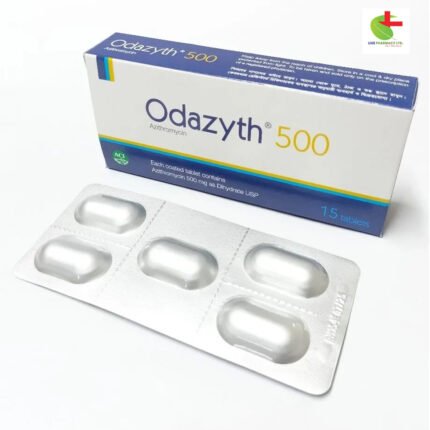Tenoren 100
13.80৳ Strip
- Tenoren is a beta-blocker used to manage hypertension, angina pectoris, and acute myocardial infarction.
- It selectively blocks β1 receptors in the heart, reducing heart rate and blood pressure.
- Can be used alone or with other antihypertensive medications to control cardiovascular conditions.
- Always take under the supervision of a healthcare professional.
 Brand
Brand
|
ACI Limited |
|---|---|
 Generics
Generics
|
Atenolol |
 Type
Type
|
Tablet |
Indications:
- Hypertension Management: Tenoren is indicated for treating hypertension. It can be used alone or alongside other antihypertensive medications, especially thiazide diuretics.
- Angina Pectoris: Tenoren is also prescribed for the long-term management of angina pectoris.
- Acute Myocardial Infarction: This medication is used for stabilizing hemodynamically stable patients with suspected or confirmed acute myocardial infarction, helping to reduce cardiovascular mortality.
Pharmacology:
Tenoren contains Atenolol, a β1-selective β-blocker that works by competitively blocking β1-receptors (cardiac) without affecting β2-receptors. Unlike other β-blockers, Atenolol has no membrane-stabilizing or partial agonist activity and is highly hydrophilic, meaning it doesn’t easily pass through cell membranes. Its action is focused on the heart, leading to reduced heart rate and blood pressure.
Dosage & Administration:
- Hypertension: Start with 50 mg once daily. If necessary, increase the dose to 100 mg per day after 1-2 weeks. Higher doses are not typically more effective.
- Angina Pectoris: Begin with 50 mg once daily. If no effect after one week, increase to 100 mg per day, with some patients requiring up to 200 mg daily.
- Acute Myocardial Infarction: Begin with 5 mg intravenous Atenolol, followed by another 5 mg after 10 minutes. Then transition to 50 mg oral Atenolol every 12 hours after the intravenous dose.
Interactions:
Be cautious when using Tenoren with other drugs like catecholamine-depleting agents, calcium channel blockers, or antiarrhythmic drugs. These combinations may lead to additive effects, including hypotension and bradycardia. Monitor closely for adverse reactions, especially with patients taking multiple heart-related medications.
Contraindications:
Tenoren is not recommended for patients with sinus bradycardia, heart block greater than first degree, cardiogenic shock, or overt heart failure. Avoid in individuals with known hypersensitivity to Atenolol or any of its components.
Side Effects:
Common side effects include bradycardia, hypotension, and fatigue. Other potential reactions include gastrointestinal issues, central nervous system disturbances, and allergic reactions like rash or respiratory distress.
Pregnancy & Lactation:
Category D: Tenoren should only be used during pregnancy if absolutely necessary, as it may affect fetal health. Atenolol can also be excreted in breast milk, potentially causing adverse effects in nursing infants.
Precautions & Warnings:
- Renal Impairment: Dosage adjustments are required for patients with impaired kidney function.
- Geriatric Use: Start at the lower end of the dosage range, considering the greater likelihood of decreased liver, renal, and cardiac function in elderly patients.
- Beta-Blocker Withdrawal: Gradually taper off beta-blockers like Tenoren to avoid rebound hypertension, especially when replacing other medications such as clonidine.
Use in Special Populations:
- Elderly & Renal Impairment: For elderly patients and those with renal issues, the starting dose should be lower. Regular monitoring is essential, and adjustments based on kidney function may be needed.
Overdose Effects:
Overdose may lead to bradycardia, hypotension, and respiratory complications. In case of overdose, treatments such as gastric lavage, activated charcoal, or hemodialysis may be required. Close monitoring and support care are crucial.
Storage Instructions:
Store in a cool, dry place, away from children. Ensure it is used only within the prescribed expiration date.













Reviews
There are no reviews yet.